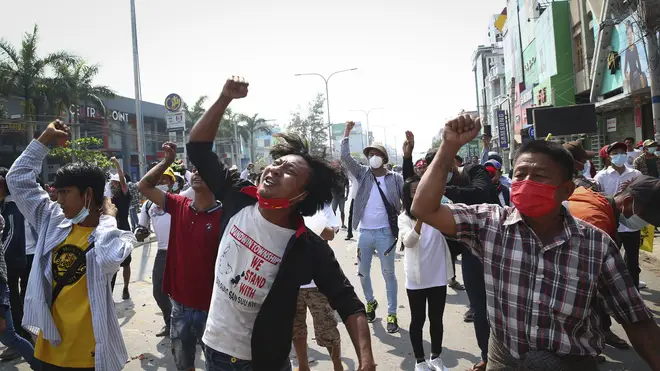
Dean Dunham 9pm - 10pm
1 March 2021, 07:44

Thousands of protesters have taken to the streets demanding the return of Aung San Suu Kyi’s elected government following the military takeover.
The UN said it has received “credible” reports that 18 people were killed and 30 others were injured after security forces in Myanmar opened fire as they sought to break up protests against the military’s seizure of power.
Protesters are demanding the return to power of the elected government of Aung San Suu Kyi after it was ousted in a coup on February 1.
About 1,000 people are believed to have been detained during demonstrations on Sunday.

The UN Human Rights Office said security forces also used tear gas as well as flash and stun grenades, adding: “Deaths reportedly occurred as a result of live ammunition fired into crowds in Yangon, Dawei, Mandalay, Myeik, Bago and Pokokku.”
An Associated Press journalist was taken into police custody on Saturday morning while providing news coverage of the protests. The journalist, Thein Zaw, remains in custody.
The AP has called for his immediate release.
Ian Phillips, AP vice president for international news, said: “Independent journalists must be allowed to freely and safely report the news without fear of retribution. AP decries in the strongest terms the arbitrary detention of Thein Zaw.”
The Foreign Correspondents’ Club of Myanmar also condemned the arrest.

The Democratic Voice of Burma (DVB) reported that there had been 19 confirmed deaths in nine cities, with another 10 deaths unconfirmed.
The independent media company counted five deaths in Yangon and two in Mandalay, the largest and second-largest cities, respectively.
It registered five deaths in Dawei, a much smaller city in south-eastern Myanmar that has seen tens of thousands of protesters take to the streets nearly every day since the coup.
Witnesses said Sunday’s march was also large and people were determined not to be driven off the streets.
Confirming the deaths of protesters has been difficult amid the chaos and general lack of news from official sources, especially in areas outside Yangon, Mandalay and the capital of Naypyitaw. But in many cases, photos and video circulated online showed circumstances of the killings and gruesome photos of bodies.

The independent Assistance Association of Political Prisoners reported it was aware that about 1,000 people were detained on Sunday, of whom they were able to identify 270.
That brought the total number of people the group has confirmed as being arrested, charged or sentenced since the coup to 1,132.
Gunfire was reported almost as soon the protests began on Sunday morning in Yangon, as police also fired tear gas and water cannon while trying to clear the streets. Photos of shell casings from live ammunition used in assault rifles were posted on social media.
Before Sunday, there had been eight confirmed reports of killings linked to the army’s takeover, according to the Assistance Association of Political Prisoners.
UN Secretary-General Antonio Guterres strongly condemned the crackdown, calling the use of lethal force against peaceful protesters and arbitrary arrests “unacceptable”, and expressed serious concern at the increase in deaths and serious injuries, UN spokesman Stephane Dujarric said.
US officials including secretary of state Antony Blinken also condemned the violence.
White House national security adviser Jake Sullivan issued a statement saying the US is “alarmed” by the violence and stands in solidarity with Myanmar people “who continue to bravely voice their aspirations for democracy, rule of law, and respect for human rights”.
Washington has imposed sanctions on Myanmar because of the coup, and Mr Sullivan said it would “impose further costs on those responsible”, promising details “in the coming days”.
The February 1 coup reversed years of slow progress towards democracy after five decades of military rule in Myanmar.
Ms Suu Kyi’s National League for Democracy party would have been installed for a second five-year term in office, but the army blocked parliament from convening and detained her and the president, Win Myint, as well as other top members of Ms Suu Kyi’s government.